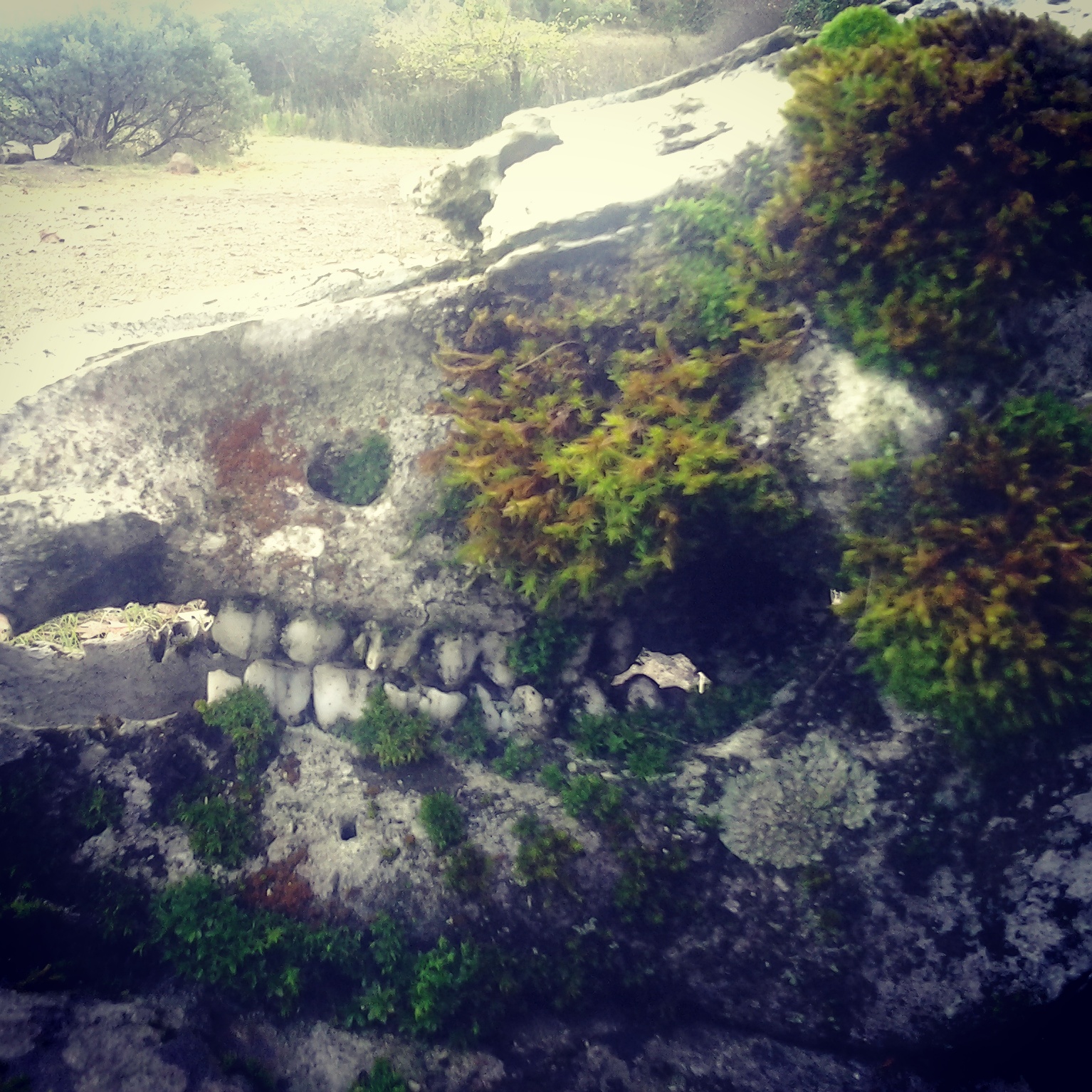This article is dedicated to the nursing staff at Kaiser Medical in San Francisco – their kindness and wisdom in matters both medical and immaterial – for helping us get through darker times.
By Ari Herman
Dad had a heart attack in  the autumn of 2015. I got the call on my lunch break. On the other end of the line, my sister sought the silver lining, saying that it was only a minor heart attack, and that it would be a wake-up call for him. There was still time.
the autumn of 2015. I got the call on my lunch break. On the other end of the line, my sister sought the silver lining, saying that it was only a minor heart attack, and that it would be a wake-up call for him. There was still time.
But how much?
A few months prior, I had moved back in with my parents. I’d spent the summer in Alaska attempting to butch-up in commercial fishing and punch a hole in my student debt. Although it was beautiful, I’d only managed to break even and come back addicted to cigarettes. I got a job on a construction site picking up trash, sorting nails and fetching tools. I was living in my childhood bedroom again. I had just turned thirty.
I left work and drove to the hospital with a cigarette in my knuckle. The vineyards were turning yellow and red off the highway. The fear of losing my dad had lay below the surface for over a decade, and now it shimmered to the forefront like a snake leaping out of the grass. I was scared and yet elated. The fear was confirmed by real danger, and there was almost a nirvana in the autumn air. I had felt so scattered and lost since graduating the previous year. The existential confusion was swept away in the simplicity of disaster.
I found dad sleeping on his side in the ICU at Kaiser in Santa Rosa. He’d checked himself in the night before and only informed his wife. His bald spot hid beneath his black and silver ponytail. He had sleep apnea and snored heavily. When he didn’t snore, he murmured words as though his stresses had pursued him into his dreams.
His chest had been shaved in patches to receive monitoring equipment. He woke up and was his normal warm self. Over the next hour, my two sisters, brother, and mother arrived. He made jokes to understate the situation, and we dubiously smiled by his hospital bed. After years of nudging him to take better care of himself, there was a certain, ‘I told you so’ humor underpinned by fear. By the end of the day, he was transferred to Kaiser in San Francisco. He’d been elected for double-bypass surgery.
We visited the SF Medical ICU in shifts. 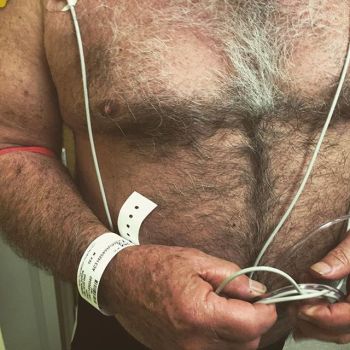 My brother gifted him wireless headphones to go
My brother gifted him wireless headphones to go
with his tablet. He would spend his days scanning articles and listening to Israeli radio. Nurses came and went with the needs of the body. We acclimated to the hospital like new fish in an aquarium. The ICU was filled with discrete tragedies behind polite curtains. I randomly saw their powerless faces, old and middle-aged, yet I was ignorant of their prognoses. How bad was it? For that matter, how bad was dad’s prognosis?
We asked a doctor, couldn’t we non-invasively stent the arteries? We went back and forth but the answer was clearly no, they needed to operate, however, complications could arise during surgery. I pursued the doctor into the main body of the ICU and privately ask to see a risk assessment given my dad’s numbers. Five minutes later he gave me a printout with the probabilities of all possible complications. There was a 13% chance of morbidity. Our father had better than 7-to-1 odds of surviving the surgery. Or, take a single dart and throw it at a dartboard. If you hit an odd-numbered black slice, you died on the operating table. My sister walked up and asked what’s up. I folded the paper and said nothing.
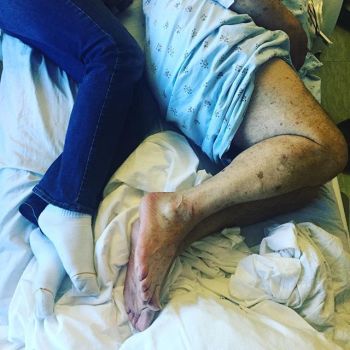 The visits felt fairly routine until he was transferred from intensive care to the cardiac unit. Post-op heart patients shuffled down the hallways, escorted by nurses while holding heart-shaped pillows to keep their sternums closed. Their expressions were gaunt, distant and stoned on opioids.
The visits felt fairly routine until he was transferred from intensive care to the cardiac unit. Post-op heart patients shuffled down the hallways, escorted by nurses while holding heart-shaped pillows to keep their sternums closed. Their expressions were gaunt, distant and stoned on opioids.
We all wanted to help, but it became contentious. There were squabbles about diet, lifestyle, stress, and smoking. Arguments broke out over pudding cups and the types of salad dressing on his meal trays. Packages of crackers were scrutinized. My siblings would engage in diplomatic talks with the staffers who brought his food, and it always made me wince.
I was intimidated by the confrontations, and yet I too became obstinate. The worst of evils, to me, was stress. Although stress was a factor, sugar was far worse, some argued. Then there were diet debates – vegan, plant-based, paleo, gluten-free, alkaline and low-sodium. And what about the frequency of his Klonopin and Percocet intake? Perhaps there was a psychological aspect? Everyone weighed in. I felt like a little kid trying to defuse tensions while casting my own ballot. Their terror reflected mine own back to me. Our yearning to keep him alive elevated the tone of the discussion to an almost ecumenical pitch. We all agreed that smoking was out.
Our father was used to having some control over his chemistry, and now everyone had an opinion that represented their need to have control, too. Control was how we could be his advocates, and if control was a single ration of water on a desert island, split between the six family members, we were going mad from dehydration all the faster. We mostly appeared calm while waiting for the knife.
The cardiothoracic surgeon met us two days before the surgery to explain the procedure and answer our questions. Dad sat up on the side of his bed to receive him. The doctor’s humble demeanor rested beneath an immaculately coordinated suit. The hands which would physically touch my father’s heart were small and soft – the opposite of the surgeon’s presence. They spoke, and at one point he reached out and touched dad’s shoulder. My dad had kept his game face on fairly well since entering the hospital. It was important to him to maintain the pretense that everything was fine. But now he seemed to recognize what was at stake. His gaze fell briefly downcast and he struggled for words. Then lifting his head, he spoke with a quaver of seriousness. He put total trust in the surgeon. We were told the surgery would take six hours. We all asked our questions with deference. He then shook our hands with a reassuring smile.
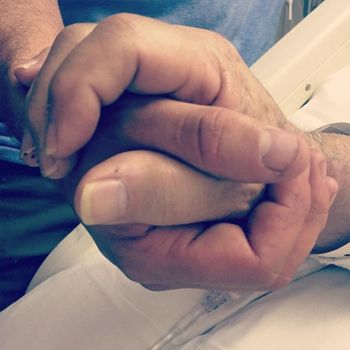 On the day of surgery, we escort our father up to the surgical unit with a small contingent of nurses. At the threshold we stop to give him one last squeeze. Men and women in scrubs hastily move in and around the surgical wing with duties as indistinct as the brood of an insect colony. Dad hugs each of us. The fear of losing him gives rise to a necessary conviction that it will be ok. Together, the certainties of fear and resignation create a strange gratitude in me. If Death, why not now? Blessed as we had been, who were we to ask for more time?
On the day of surgery, we escort our father up to the surgical unit with a small contingent of nurses. At the threshold we stop to give him one last squeeze. Men and women in scrubs hastily move in and around the surgical wing with duties as indistinct as the brood of an insect colony. Dad hugs each of us. The fear of losing him gives rise to a necessary conviction that it will be ok. Together, the certainties of fear and resignation create a strange gratitude in me. If Death, why not now? Blessed as we had been, who were we to ask for more time?
My dad had smoked cigarettes for most of his life. The smell of them reminds me of being a kid and driving to his construction sites in the beat up blue pickup. In our home, there are yellowing black and white photos of a young Israeli officer. He’s wearing dark sunglasses with a cigarette in his lip, brandishing a rifle and leaning against a jeep on the border of the Negev. It must have been ’67.
Our parents had met in the late 70s out in West Sonoma County. They were introduced by mutual friends in the Jewish community. I was told that dad crashed his grocery cart into a stack of cans when he first saw her.
One afternoon on Main Street, mom noticed dad pretending to not check her out. She walked up to him, took his arm and asked, “Would you like to buy me a drink?”
“I bought myself a brandy,” dad recalled. “Yuck!”
Mom had grown up in Claremont, California, when it was a college town with orange groves. On cold nights, the air smelled of kerosene from heaters protecting the citrus from frost. She moved to San Francisco when she was 20 and worked in the music industry, then escaped to Sonoma County. They had their first daughter in the summer of ’81 and their last child and son in ‘91.
If Death, why not now?
Back in the hospital, dad hugs me and whispers, “See you soon!” I hug my brother who has begun to crack. Mom kisses dad with that strange balance of strength and tenderness that love embodies, whose symmetry is briefly idyllic, and then unfolds into mystery. He isn’t crying because he is afraid for himself. He is afraid that he wouldn’t be able to take care of us any longer.
Everyone took themselves away, then. I stay behind with the digital pager that will beep when dad leaves surgery. I sit and write terrible poetry, some lost lines about refusing to pray and yet waiting for an answer. The pager rests on the table in the cafeteria. On it, a red light blinks like the insertion point on a word processor, like drops of red electric blood, or a sonar lost at sea. Four hours go by. The dart flies. And please, don’t take my daddy away from me…
On the fifth hour, mom and my ex-girlfriend show up with dim sum. We’d remained familial since ending the relationship and her support was huge for us. Then one sister followed by our brother. Our eldest sister had gone home exhausted. We sit around the table and manage to keep it light. The only part of the conversation I recall from those seven hours was when the pager answered with “beep-beep-beep… beep-beep-beep.”
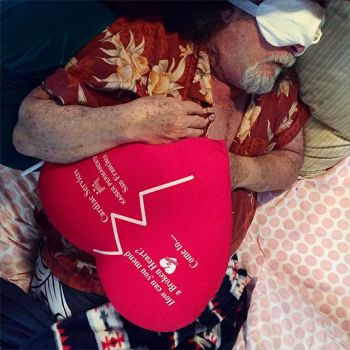 Dad came through surgery fine. The surgeon had taken longer than usual, in order to find a heartier piece of artery for the bypass. A wave of relief surged through the post-op waiting room and subsided. The surgeon asked where dad was from originally. We told him Israel and before that South Africa. I asked where his family was originally from, and he said Pakistan. At first it seemed important, but in hospitals these merits matter less than anywhere else. We all shook hands once more, relieved.
Dad came through surgery fine. The surgeon had taken longer than usual, in order to find a heartier piece of artery for the bypass. A wave of relief surged through the post-op waiting room and subsided. The surgeon asked where dad was from originally. We told him Israel and before that South Africa. I asked where his family was originally from, and he said Pakistan. At first it seemed important, but in hospitals these merits matter less than anywhere else. We all shook hands once more, relieved.
My mom and sister went in first. After a while, I came in to replace mom. I took up his right hand and my sister his left. His face was swollen, causing his eyelids to protrude like small succulents. He was intubated to a ventilator, and his mouth looked like a fish’s. He was surrounded by an orchestra of machines, cables, pumps and bags all infusing and monitoring in concert. A clear hose ran beneath his gown draining watery blood. From stillness, his face suddenly pinched and he squeezed my hand so hard as to bend the bones. His body shook. The pain in his face was incomprehensible. Nurse! my sister whispered or yelled.
I began to disassociate through hallucination. I thought I saw the line of his nose extend over his left eyebrow like a single horizon. His right eye appeared to dip below that horizon while the other appeared in the sky, like reflections of the same cosmic phenomena refracting in the mirage of an antique desert. The nurse administered more Dilaudid and he relaxes his grip. The beeping heart monitor and gentle whooshing of the breathing machine drew me back into the room again. I realized I was being given a gift: An anti-smoking ad woven in the tapestry of my father’s face.
I quit smoking with the aid of an e-cigarette.
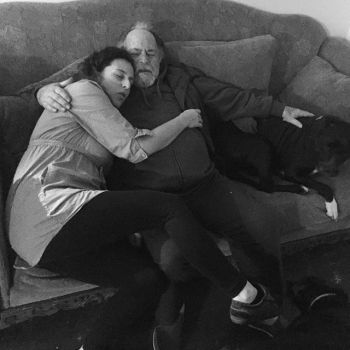 When dad came home after surgery the family began to feel the exhaustion of long-term stress. Our anxiety never seemed to lift, so we all tried to placate it in different ways. I worked and drank. Mom went mushroom hunting and shopped. One sister went to nature, another went to therapy. My brother reached for control through dietary wisdom and Olympian workouts. We took turns cooking for and medicating our father.
When dad came home after surgery the family began to feel the exhaustion of long-term stress. Our anxiety never seemed to lift, so we all tried to placate it in different ways. I worked and drank. Mom went mushroom hunting and shopped. One sister went to nature, another went to therapy. My brother reached for control through dietary wisdom and Olympian workouts. We took turns cooking for and medicating our father.
He was forgetful and depressed, which are common side effects of cardiothoracic surgery. Resentment lay like a low cloud between us as we tried to regulate his Percocet intake. We took turns sleeping by his bed to help him get up, lay down, and dose him in the night as needed. I could hear him chew the pills to make them hit harder. It made the relief stronger, but shorter. Two hours later he would ask for more. When I would stick to doctor’s orders by restricting his opioid use to 4-hour increments, he would angrily call me a fascist. It gratified me have control over his health. He was alive, and we’d keep him that way even if it made him a little unhappy.
Watching my dad try to reinvent himself was both disappointing and encouraging at different times. His struggled to live up to our collective expectation. We wanted him to express a life-affirming attitude with daily walks and healthier eating, rather than the odd cigar and “just one little” scoop of sugar in his tea. He was extremely recalcitrant. When we took away the sugar, he resorted to putting jam in his tea, so we took away the jam, too. We would end in a standoff with him over and over again, us feeling betrayed by his vices, and him feeling disrespected by our disregard of his sovereignty.
At a dive bar one Friday, I bitched about the situation to my buddy Sadik. I laid it out, concluding, “It’s like he’d rather die than change his lifestyle.”
“Well, it seems like Doron is ready to die, then,” he responded.
I got angry and accused him of capitulating to the notion that anyone was an island – our dad was our rock – and we needed him.
Sadik explained how he’d been through this with his dad years before. His dad had concluded that it was no one’s business what he did with his one life. Sadik sipped his beer. Then, he took the gloves off and let me have some more truth.
“You guys are a little too grown up to be relying on your dad anymore. Your mom, I understand, but you and [your sister]? What is he, like 70-something? You guys shouldn’t be hangin’ around the nest like that anymore.”
With that, he finished his beer and left me drinking my last paycheck; the construction job had dried up.
He had shamed me enough to see the heart of the matter: My dad was still going to die, and there was nothing I could do. Even though we loved him, none of us had the right to make his decisions. Our feelings weren’t wrong, and yet the family rarely looked past his flaws without yearning to smack the hornet of vice that threatened to take him prematurely. We wanted every drop of time possible.
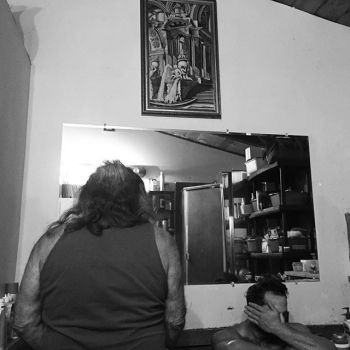 The crisis had passed but life had not returned to normal. Our house had become toxic. I lost my temper one evening and attacked my brother by hurling a metal bolt at his head. The reflex to attack was utterly mechanical. I cut his head open, narrowly missing his eye. A friend jumped between us. Blood dripped onto his trapezoid as he hollered curses at me from all of his being. I was unspeakably ashamed, and yet it felt good to see blood. “You guys need to stop! You’re upsetting dad!” someone pleaded.
The crisis had passed but life had not returned to normal. Our house had become toxic. I lost my temper one evening and attacked my brother by hurling a metal bolt at his head. The reflex to attack was utterly mechanical. I cut his head open, narrowly missing his eye. A friend jumped between us. Blood dripped onto his trapezoid as he hollered curses at me from all of his being. I was unspeakably ashamed, and yet it felt good to see blood. “You guys need to stop! You’re upsetting dad!” someone pleaded.
I moved out that night in a fuming rage of resentment and lived in my car for several weeks. I briefly roadtripped to Portland and relapsing into cigarettes. When I moved back in, my brother refused to speak with me. I apologized, but he continued to shut me out. The house was icy with our anger. Dad still needed help. So, I resorted to something I never imagined possible.
I left my agnostic perch and I called a rabbi — for advice.
Like a cliché in some old folk tale, I complained, Rabbi, I attacked my brother but I apologized and he refuses to speak to me. What else can I do?
The rabbi told me this: I’d acted crazy. I’d apologized for my conscience sake more than to relieve my brother’s rage, which was selfish. My timeline for when he should forgive me was irrelevant, and the same was true for my father’s recovery — these things happened on God’s time, not ours. Also, I was too focused on myself and not on others. He managed to say all of this kindly. He offered to work with me on Torah studies, but I never took him up on it. I thanked him and went back to the house.
A month later, my brother broke the silence. He knocked on my door around noonday. I was still in bed. “Alright, let’s squash this,” he said, leveling his eyes. He said that he’d remained angry because the family was more concerned about my mental health over his injuries or condemning my violence against him. Apparently, the rabbi was not alone in his opinion. Although scars remained, it was an enormous relief to feel the blood drain between us. My brother left me sitting in my bed.
I had gained weight and lost spirit. I had held my father to a standard of health that I had completely abandoned for myself. Dad was like the center of a wheel, and everyone who relied on him were spokes. I needed to learn to become an axis rather than a spoke. The worst thing I could do was continue to accept free housing for a perfunctory effort on my part.
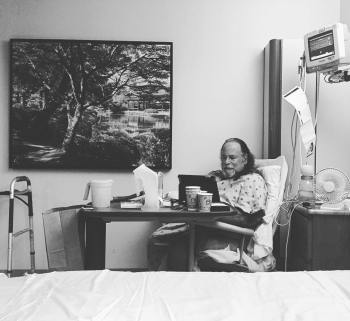
My sister was accepted into a graduate program and I moved to Seattle for an internship. I hadn’t lived away from home since college. I wake up every day and take everything that I care about and spin it around myself. None of it moves without me, and I like who I am at the center of what can still be beautiful times.
Dad goes on more walks these days. I never ask about his diet. I do ask how he is feeling; that is the extent of my control – almost.
In the hospital, before the knife, my eldest sister and I were alone with him. We were thinking of ways to bribe him into reforming his lifestyle.
She said, “If you take better care of yourself, I’ll make you a grandparent.”
Not looking up, one eyebrow lifted. He intoned a contemplative, “Hmmm.”
I seconded, “If you clean up your act, I’ll publish a book.”
Two eyebrows up.
She is publishing a baby girl in July, and I’ve been in labor since the New Year.
